 Does showcasing LGBTQ people as being in ‘respectable’ heteronormative relationships increase support for the LGBTQ movement? In new research, Phil Jones examines how straight people react to LGB people who are portrayed as not being respectably monogamous. He finds that straight people’s feelings of similarity with, and support for, LGB people are largely unaffected by the relationship type they are shown.
Does showcasing LGBTQ people as being in ‘respectable’ heteronormative relationships increase support for the LGBTQ movement? In new research, Phil Jones examines how straight people react to LGB people who are portrayed as not being respectably monogamous. He finds that straight people’s feelings of similarity with, and support for, LGB people are largely unaffected by the relationship type they are shown.
The modern LGBTQ movement has adopted a common strategy for marginalized groups, of respectability politics. The logic is straightforward: by emphasizing how proper and ‘respectable’ your members are, others will see you as similar to themselves and be more likely to support your cause. In the LGBTQ case, this led to emphasizing “love is love” and showcasing queer people who were in respectably heteronormative relationships.
But does the strategy actually work? In recent research, I designed two survey experiments to find out. The results show LGB (my research refers to LGB people and rights specifically rather than to the LGBTQ community or movement) respectability politics might be over-hyped. Whether LGB relationships are shown as respectably monogamous and exclusive or not had no real effects on straight people’s attitudes.
The LGBTQ respectability politics strategy
In recent years, LGBTQ groups consciously chose to present same-gender relationships as “just like” respectable straight ones. Of particular concern was demonstrating they stuck to norms of monogamy and exclusivity. For example, strategy memos told activists to emphasize “commitment and other shared values” and to refer to queer relationships as “long-term, lifelong, stable. permanent”.
When it came to choosing figureheads who could represent the movement in legal cases and media blitzes, their respectability was critical. In the search for marriage equality plaintiffs, lawyers vetted thousands of potential couples, asking questions about their relationship status, whether they were monogamous, and any risqué photos or videos that might surface online.
Those who weren’t considered appropriately monogamous and exclusive — like plaintiffs in the landmark Lawrence v. Texas and U.S. v. Windsor cases — were stopped from discussing their relationships with the media so that their sexual “escapades” could be repackaged as a love story” for straight people’s consumption.
Throughout, the movement assumed that straight voters would be more likely to see LGB people as similar to themselves, and thus deserving of the same rights, if they were presented in respectably monogamous and exclusive relationships. But is that assumption right? To find out, I created two survey experiments.
Assessing reactions based on relationship status
Straight respondents to the 2018 Cooperative Election Study, a nationally representative online survey, were asked to read a quick news story about a gay man denied service at a bakery because of his sexuality. Respondents were randomly shown one of two versions of the story, which can be seen below (these are fictitious stories but based on real-life cases). In one, the man was shown in a respectable, two-person relationship. In the other, he was shown as part of an open throuple (a relationship between three people). All the remaining information given in these stories was exactly the same, meaning any differences in how people responded could only be because of his relationship.
Figure 1 – Two story versions to assess reactions to relationship types
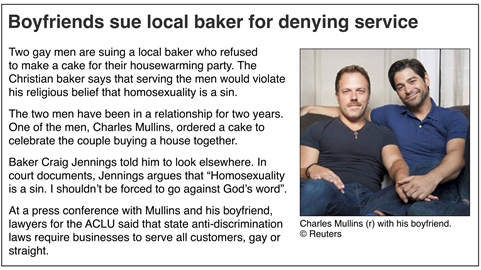
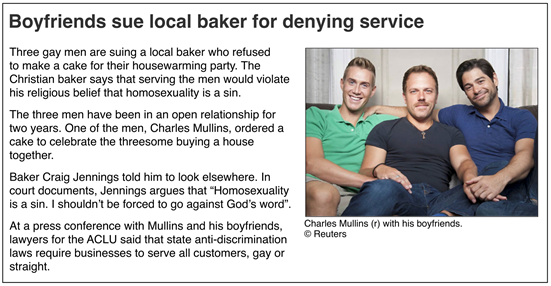
So, did straight Americans feel differently about the men and their case depending on which version of the story they read? In short, no. The estimates shown in Figure 2 below show the effect of being shown the two-person version of the story, rather than the three-person version. Responses were all measured on a 0 to 1 scale, where higher values meant more support for the men and their case.
Figure 2 – Effects of respondents being shown two-person version of the story
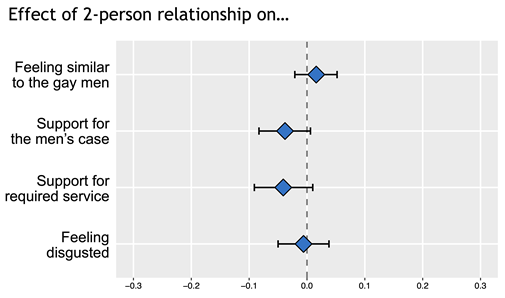
Showing the men in a two-person relationship had no effect, as you can see from the confidence intervals that overlap the zero mark. It didn’t make straight respondents feel more similar to the gay men, or more supportive of their case. Nor did it make them more likely to support businesses being required to serve LGB people, or to feel disgusted (which previous research shows strongly predicts attitudes on LGBTQ rights).
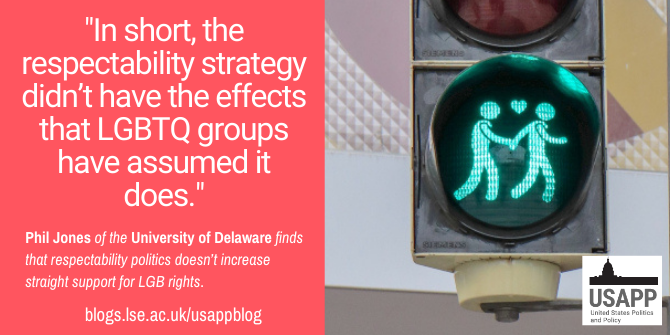
Photo by Rodrigo Curi on Unsplash
In short, the respectability strategy didn’t have the effects that LGBTQ groups have assumed it does. Straight voters were equally supportive whether the LGB people were shown as respectably monogamous or not.
A second experiment tested these results in a potentially more sensitive context. Straight respondents were asked to read a story about a teacher fired for coming out to their students. This time, I created several versions of the story, changing up whether they were in a monogamous (or open) relationship, with one (or two) other people, among other factors. Respondents’ attitudes were again measured from 0 to 1, with higher values meaning more support for the teacher and their case.
The blue bullets in the plots below show the effect of that factor, relative to the white bullets. For example, the first blue bullet shows the effect of the teacher being in a committed relationship (rather than an open relationship) on feelings of similarity with them.
Figure 3 – Effects of respondents being shown versions of the teacher story
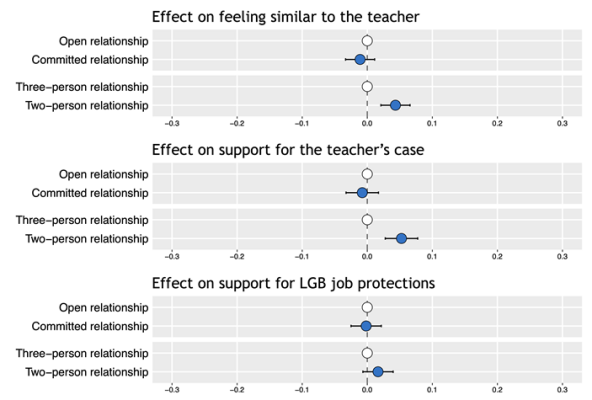
As before, being in a committed (rather than open) relationship had no effect on how similar respondents felt to the plaintiff or how much they supported their case.
This time, however, there was a positive effect of being in a two-person relationship. Respondents were more likely to feel similar to the teacher, and more supportive of their case, when told they were part of a couple rather than a throuple. These effects are pretty small, however, moving attitudes by only .05 on the 0—1 scale, and don’t appear at all when it comes to support for broader LGB rights. Additional analyses in the paper show that they were dwarfed by the effects of party, ideology, and other characteristics, too. Overall, any benefits of showing LGB people in a two-person relationship were minor indeed.
The minimal benefits of LGB respectability politics
Although it’s been a key strategy of the LGBTQ movement, these experiments show that presenting LGB people in respectably monogamous and exclusive relationships does not have much effect on straight people’s attitudes. Straight people’s feelings of similarity with, and support for, LGB people was largely unaffected by the relationship types shown.
There are some important caveats to that conclusion. First, it’s possible that respectability politics used to be a winning strategy, but that its effectiveness waned over time. Unfortunately, these experiments are the first to directly test the strategy, and so we can only speculate about how things would have been in the past. Second, there are lots of ways to try and prove you are “respectable”, and these experiments only assess one (being in a monogamous, exclusive relationship). We can’t extrapolate from these findings to more general claims about all types of respectability. Finally, these experiments concern only cisgender LGB people. As attacks on transgender people start to replace fights over LGB rights, understanding if and how respectability affects support for trans people is a crucial next step.
Overall, though, this shows that LGB respectability politics doesn’t have the kind of benefits advocates often assume. Going out of their way to portray same-gender relationships as monogamous and exclusive doesn’t bring the kind of straight support that groups hope for. As such, it seems the movement could center all of its members without having to worry about spooking outsiders.
- This article is based on “Respectability Politics and Straight Support for LGB Rights”, in Political Research Quarterly.
Please read our comments policy before commenting.
Note: This article gives the views of the author, and not the position of USAPP – American Politics and Policy, nor the London School of Economics.
Shortened URL for this post: https://bit.ly/3tCl8jo
About the author
 Phil Jones – University of Delaware
Phil Jones – University of Delaware
Phil Jones is an Associate Professor of Political Science and International Relations at the University of Delaware. His research focuses on LGBTQ politics, public opinion, and political behavior.




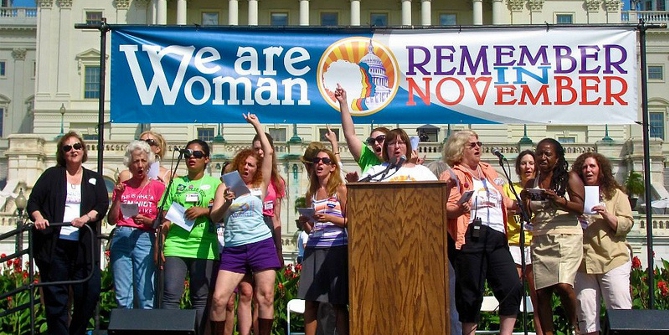

This is an empowering article, thank you. Respectability politics within the LGBTQIA+ community is a complex and often debated topic. While some argue that behaving in a way that fits into societal norms will lead to greater acceptance and equality, others believe that true progress can only come from being unapologetically authentic. It’s important to remember that everyone deserves respect and dignity, regardless of whether they fit into mainstream society’s expectations. Embracing diversity and celebrating individuality is what truly moves us forward toward a more inclusive and accepting world. So let’s continue to empower and uplift each other, regardless of how we choose to express ourselves.